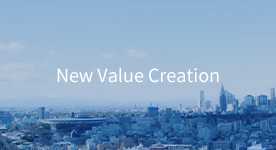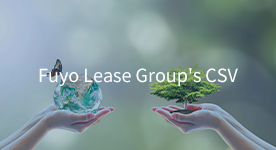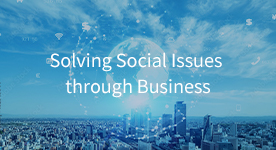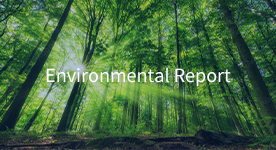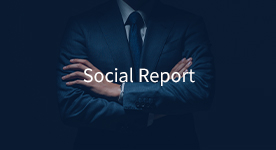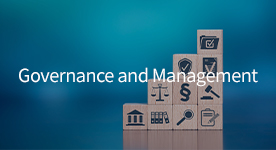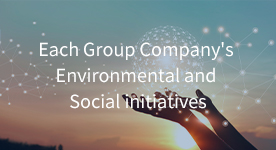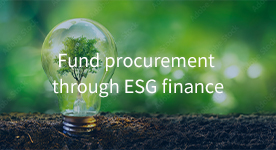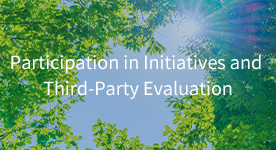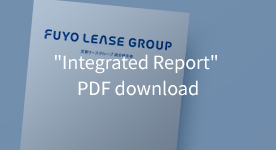Fuyo Lease Group’s Value Creation Process
The Fuyo Lease Group's value creation process, which emphasizes CSV (Creating Shared Value: the simultaneous realization of corporate value and social value) management, is to achieve sustainable profit growth while solving social issues in the areas of “environment” and “society and people” through business in various domains. To achieve the vision for 2030 under this process, the Medium-Term Management Plan Fuyo Shared Value 2026 concentrates investment of management resources on the growth drivers selected from the multiple business domains the Group possesses and is engaged with emphasis on organizational and structural support for sustainable value creation, such as human resource investment and DX, and building partnerships with customers.
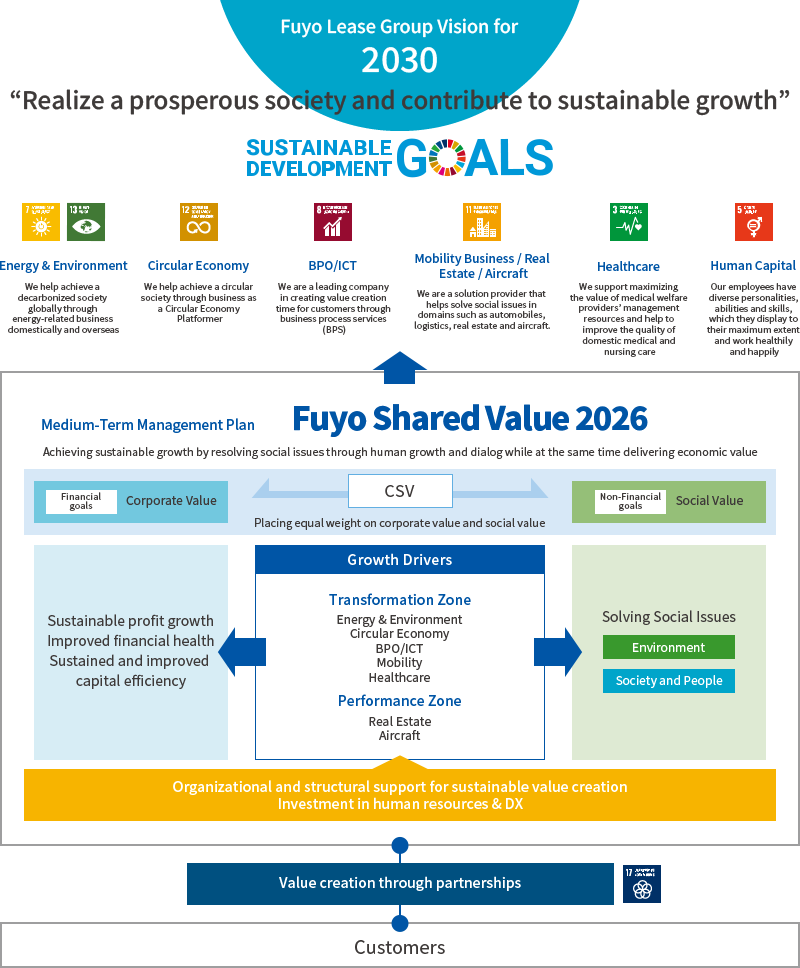
Materiality
We have identified materiality as an important item in relation to the key elements of the value creation process of environment, society and people, organizational and structural support for sustainable value creation and value creation through partnerships. Non-financial KPI and targets for fiscal 2026, the final year of the medium-term management plan, have been set for each materiality issue, and we monitor progress while moving forward on each materiality issue.
Identifying Materiality
-
STEP 1
Determining a vision for 2030
-
Based on our CSV approach, we discussed and determined a vision of how we want each business area in each domain to be in 2030, taking into account what the world will be like in 10 years’ time.
-
STEP 2
Considering important issues
-
While drawing up the medium-term management plan, we specified the 2030 Vision of each business domain and, back casting from this, identified important issues where there are strong needs to create social value and business opportunities.
-
STEP 3
Discussions in each domain and at management level
-
During discussions* on drawing up the medium-term management plan, we positioned non-financial issues with equal weighting to financial issues and discussed the suitability of each non-financial issue while taking into account a long-term strategy.
-
*Discussions were carried out in a multi-layered manner throughout fiscal 2021, with outside directors taking part in discussions over several occasions.
-
-
STEP 4
Setting non-financial KPI
-
As KPIs to monitor the progress of each important issue, we have set appropriate indicators and goals in alignment with the Medium-Term Management Plan Fuyo Shared Value 2026.
-
STEP 5
Discussion and approval at the Board of Directors
-
Discussed by the Board of Directors and approved by the Board of Directors based on the opinions of outside directors.
Materiality for Fuyo Lease Group
The Materiality identification process shown above identified eight material issues to be addressed through our new Medium-Term Management Plan Fuyo Shared Value 2026.
-
1.Contribution to the realization of a decarbonized society
-
2.Contribution to the realization of a circular society
-
3.Delivery of reassurance by ensuring health and welfare
-
4.Creation of new value creation time
-
5.Strategic human resources development
-
6.Diversity and inclusion
-
7.Health and productivity management, work-life balance
-
8.Value creation through partnerships
Targets and Results of Materiality (Creation of Social Value through Business Activities)
Environment
1.Contribution to the realization of a decarbonized society
| Non-Financial KPI | FY2022 Results | FY2026 Targets | Relevant SDGs |
|---|---|---|---|
|
CO₂ emissions reduction contribution |
220,000 t-CO₂ / year |
500,000 t-CO₂ |



|
|
Amount invested in promoting decarbonization*1 |
¥56.4 billion |
Total of ¥300.0 billion over five years |
|
|
Renewable energy power generation capacity*2 |
515MW |
1,000MW |
|
|
Percentage of Group vehicles that are EVs or FCVs (percentage held by Fuyo Auto Lease) |
0.7% |
30% |
|
|
Amount of financing handled for the promotion of decarbonization*3 |
¥5.3 billion |
5-year cumulative total ¥ 12.0 billion |
2.Contributing to the realization of a circular society
| Non-Financial KPI | FY2022 Results | FY2026 Targets | Relevant SDGs |
|---|---|---|---|
|
Percentage of returned items that are reused or recycled*4 |
100% |
100% |



|
|
Percentage of materials / chemicals contained in waste plastics (from returned items) that are recycled*4 |
24.7% |
100% |
Society and people
3.Delivery of reassurance by ensuring health and welfare
| Non-Financial KPI | FY2022 Results | FY2026 Targets | Relevant SDGs |
|---|---|---|---|
|
Number of new rooms provided at elderly care homes |
553 rooms |
5-year cumulative total 1,330rooms |



|
|
Management support-related financing in medical and welfare markets*5 |
¥ 21.7 billion |
¥56.0 billion |
4.Creation of new value creation time
| Non-Financial KPI | FY2022 Results | FY2026 Targets | Relevant SDGs |
|---|---|---|---|
|
Work hours saved by our customers |
+180,000 hours |
+1 million hours compared to FY2021 |



|
Organizational and structural support for sustainable value creation
5.Strategic human resources development
| Non-Financial KPI | FY2022 Results | FY2026 Targets | Relevant SDGs |
|---|---|---|---|
|
Human resource development-related expenses (non-consolidated) |
188% |
300% compared to FY2021 |


|
6.Diversity and inclusion
| Non-Financial KPI | FY2022 Results | FY2026 Targets | Relevant SDGs |
|---|---|---|---|
|
Percentage of female employees in management positions (non-consolidated) |
30.9% |
35% |


|
|
Percentage of eligible male employees who have taken childcare leave*6 (non-consolidated) |
100% |
100% |
7.Health and productivity management, work-life balance
| Non-Financial KPI | FY2022 Results | FY2026 Targets | Relevant SDGs |
|---|---|---|---|
|
Percentage of employees aged 35 or over who have had a health examination (non-consolidated) |
100% |
100% |


|
|
Rate of taking annual paid leave (non-consolidated) |
93.5% |
90% |
|
|
Rate of taking the +Friday system (non-consolidated) |
89% |
No quantitative target |
|
|
Percentage of improvement in engagement indicators*7 (consolidated) |
3.48 |
No quantitative target |
Value creation through partnerships
8.Value creation through partnerships
| Non-Financial KPI | FY2022 Results | FY2026 Targets | Relevant SDGs |
|---|---|---|---|
|
Investment in venture companies that have technologies and services that will create new social value |
Investment Record
|
No quantitative target |

|
-
*1Applies to investments in renewable energy facilities, energy-saving facilities, electric vehicles (including charging equipment), batteries, hydrogen and ammonia-related facilities, CO₂ separation and recovery technologies (CCUS, DAC), circular-related facilities, ZEB / Green buildings, SAF and start-up companies.
-
*2Applies to investments and project financing, etc., made in the Renewable Energy Generation Business (power generation capacity is calculated based on ownership ratio or share)
-
*3Covers the Fuyo Zero Carbon City Support Program and the Fuyo 100% Renewable Electricity Declaration Support Program
-
*4Applies to leased (rental) assets returned to the Hachioji Technical Center of FGL Circular Network Co., Ltd.
-
*5The balance of operating assets for financing related to FPS Medical (factoring for medical and nursing care receivables by Accretive) and business succession.
-
*6Childcare leave taken percentage is calculated as the ratio of the number of employees who took childcare leave during the relevant fiscal year to the number of employees eligible for childcare leave during the relevant fiscal year (number of people who had a child within the fiscal year).
-
*7In the employee opinion survey, eight questions (five-point assessment scale) that represent engagement as defined by the Fuyo Lease Group (a relationship in which each employee links the Company's growth to their own growth and they contribute to each other's growth), and the average response value was measured."

